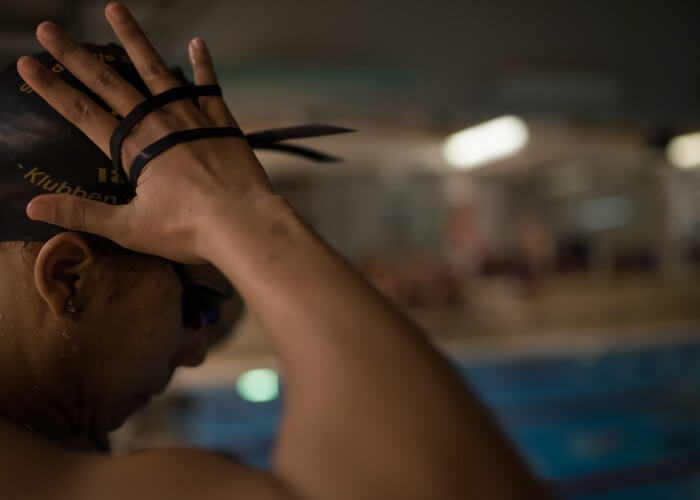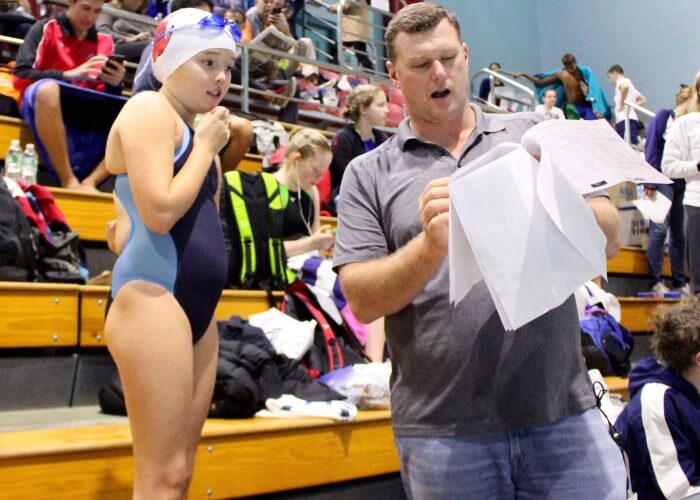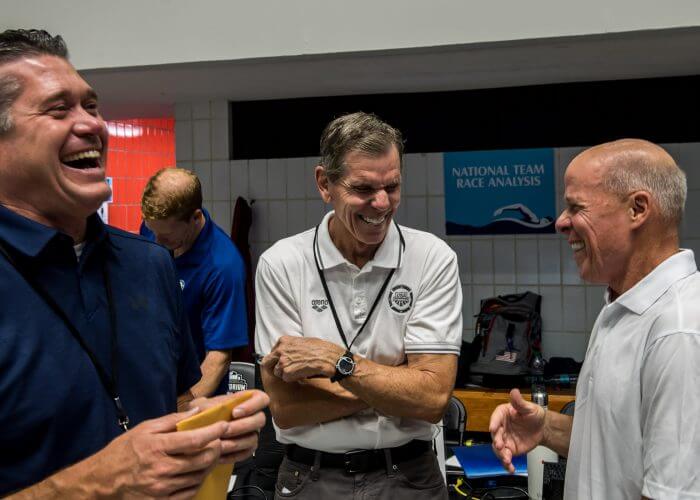The Coachable Swimmer: 5 Ways An Athlete Can Be Open For Improvement

As swimmers, we can look for quick fixes. We know that we can adjust a flip turn here, tweak a breath there, and throw in a few extra dolphin kicks off of our start—and that could shave time off of even the shortest of races. However, we are not always eager to reach for the more long-term aids to our performance. One of those aids is related to mindset: how coachable are you?
Here are five ways you can become more coachable this season:
1. Take responsibility for your performance.

Photo Courtesy: Robin Sparf
If you don’t own your piece of the pie in your swimming performance, then you cannot expect to improve your performance.
Do you make excuses for your swims that fall short? If you constantly blame the blocks, the lane lines, or the water temperature for your shortcomings, then the odds are that you are not owning your own role in your race.
You have the power to, as Jim Afremow writes in The Champion’s Mind, “take control of your personal destiny.” Afremow suggests owning this role by spending time journaling, meditating, eliminating unnecessary stressors, and finding accountability partners. Your coaches can be some of the most important accountability partners in your life. Once you are willing to attribute your performance to your personal efforts, then you can use your coaches.
2. Be willing to be uncomfortable.
It can be difficult to listen to a coach’s criticisms. If you are a flyer, hearing that your butterfly technique has a serious flaw can be discouraging. Lifelong distance swimmers do not enjoy hearing that their pacing strategy is unsustainable. And yet, if you aren’t willing to honestly assess your abilities in light of your goals, then you cannot go very far.
Each day of practice, however, is an opportunity to change for the better. Football player Jerry Rice is famous for saying, “Today I will do what others won’t, so tomorrow I can accomplish what others can’t.” If you are willing to step out of your comfort zone, you can then be willing to embrace change in your technique and training—change that your coaches can introduce to you.
3. Listen to advice—even if you do not think the advice is helpful.

Photo Courtesy: Taylor Brien
Legendary basketball coach John Wooden suggested that, “Whatever you do in life, surround yourself with smart people who’ll argue with you.” Everyone—even the greatest of athletes, artists, and leaders—need someone to hold them accountable. You are your own best coach, since you feel your body in the water each day, but you cannot possibly see yourself swimming each day. Your coach does. Lean on him or her.
You have nothing to lose by trying something once in practice. You have everything to gain by being more coachable. A new breaststroke kick or starting technique may feel awkward, but showing your coach respect by trying out their suggestions is a win-win. If their suggestions work, then you’ve made progress. If their suggestions don’t work, and you’re able to speak truthfully about something that feels off, then they can give you alternate suggestions or brainstorm different ways of improving elements of your performance for the future.
4. Remember that your coach is a person, too.

Photo Courtesy: Peter H. Bick
Your coach wants to have a relationship with you—not just to tell you what to do. If you can respect your coach and have open conversations with your coach, on and off the pool deck, you will both be better off. You will be more coachable, and your coach will feel more valued. Why not let your coach get to know you better as a person, not just a swimmer, in order to help you with your strategies and technique?
Knowing that you love to analyze data or that you were a gymnast in high school may allow your coach to help you maximize your performance potential. Knowing that your coach once lost a swimmer in a car accident or that your coach specialized in the 200 butterfly can allow you to consider their advice more thoughtfully. Get close enough to your coach that you can allow them to enter into your inner circle of friends who push you to be your best.
5. Pursue progress—not victory.
There is a difference between trying to win and trying to improve. Swimmers who try to win are reliant upon the performance of their competitors in order to feel successful. Swimmers who try to improve and enjoy the process of getting better are reliant upon their own efforts in order to feel successful.
By pursuing improvement, rather than victory, you can recognize all of the ways that your coach wants to help you and will continue to help you. In the end, you will not just be more coachable, but you will also be more content.
The motto of Lexus is “In the pursuit of perfection.” The implication of this motto is that, although perfection may not be achievable, it is worth striving for. Why not chase after perfection with your coach? You will never arrive at your destination, but you can still move forward with your swimming career.
All commentaries are the opinion of the author and do not necessarily reflect the views of Swimming World Magazine nor its staff.




Check your stock photo. I think that coach is banned
You can delete my comment now if you like
Thanks for pointing that out. We have remedied the situation!
Cyrus David G. RimandoHans AragonaIsabel AlmoiteJaliyah Ryzia CaluzaEnrique NacnacSean BarrozoJustin RafananDhen HadsanLahainah DigermoPrecious dela PeñaRob BalderasBreanna Ulatan Cris Shuntelle BatoAurora Nicole ?
Isabella Cesareo
Nick Quigley
?
Sebastian Konnaris
Kel – one for GSC
thank you for your 5 Ways In which An Athlete Can Be Open For Improvement